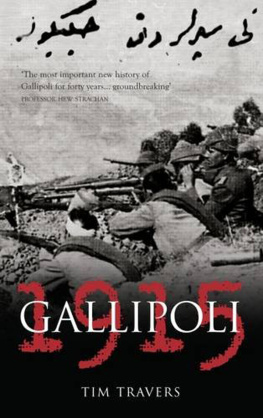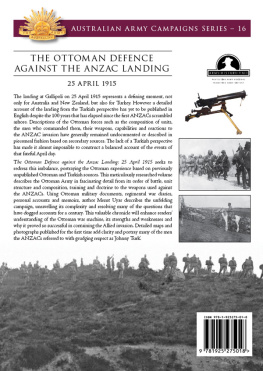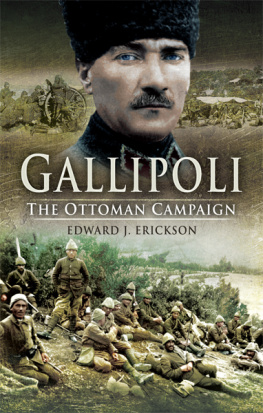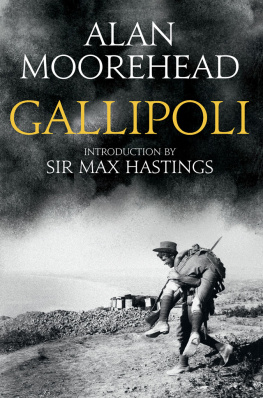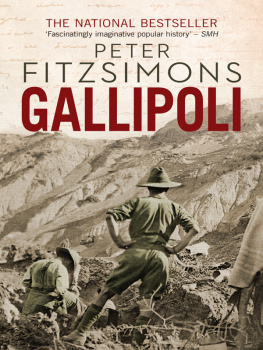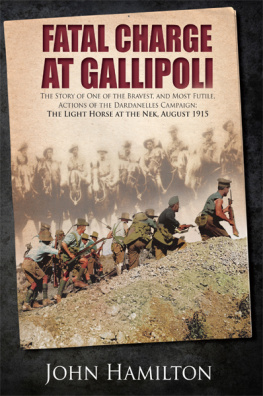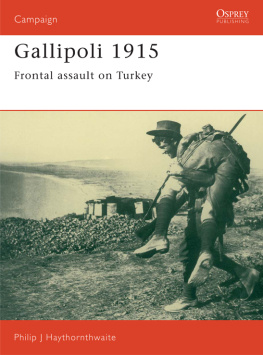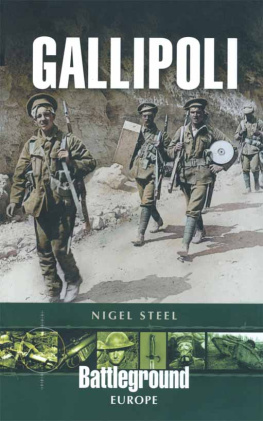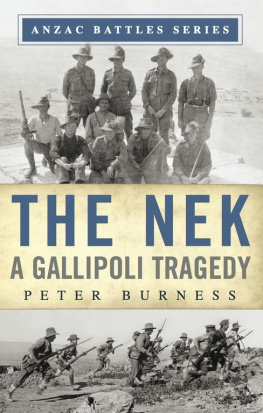

TIM TRAVERS

Cover illustration: Turkish soldiers firing from Halil Bey Hill toward Gelik Lake, courtesy of the General Staff Archives, Ankara.
First published 2001
This edition first published in 2009
The History Press
The Mill, Brimscombe Port
Stroud, Gloucestershire, GL5 2QG
www.thehistorypress.co.uk
This ebook edition first published in 2016
All rights reserved
Tim Travers, 2001, 2002, 2004, 2009
The right of Tim Travers to be identified as the Author of this work has been asserted in accordance with the Copyrights, Designs and Patents Act 1988.
This ebook is copyright material and must not be copied, reproduced, transferred, distributed, leased, licensed or publicly performed or used in any way except as specifically permitted in writing by the publishers, as allowed under the terms and conditions under which it was purchased or as strictly permitted by applicable copyright law. Any unauthorised distribution or use of this text may be a direct infringement of the authors and publishers rights, and those responsible may be liable in law accordingly.
EPUB ISBN 978 0 7509 7906 1
Typesetting and origination by The History Press
eBook converted by Geethik Technologies
CONTENTS
Tim Travers is Professor of History at the University of Calgary in Canada. His great uncle was killed in action at Gallipoli and the author has dedicated the last five years to finding out what really went wrong for the Allies in 1915. His other books include the widely praised The Killing Ground (The most effective critic yet of Haig and his generals History). He has also contributed to The Oxford Illustrated History of the First World War and The Oxford History of the British Army. He lives in Canada.
PROLOGUE
A Familys Sacrifice
L ate in the afternoon, we finally found his grave. It was located in the Hill 10 cemetery at Gallipoli. Maj. Hugh Price Travers, the authors great uncle, was reported missing on 9 August 1915 at Suvla, and we had been searching for his grave for the better part of a day among all the beautifully kept cemeteries of Gallipoli. But how had he died? The war diary of his unit, the 8th Battalion, Duke of Wellingtons (West Riding) Regiment, provided the only information. The battalion suffered heavy losses on 9 August 1915 at Suvla, and a much stained war diary, written by Capt. V. Kidd, who by the time of writing on 17 August commanded the battalion in the absence of any more senior officers, offered the scanty details. At dusk on 8 August, the battalion moved up on the left of the West Yorkshire Regiment. At 4.00 a.m. on 9 August the Regiment advanced to attack the hills of Tekke Tepe, following along behind the East Yorkshire Pioneers. This was an attack that had been ordered late on 8 August by Sir Ian Hamilton, Commander-in-Chief, Mediterranean Expeditionary Force, who was desperate to attain the Tekke Tepe heights before the Turks arrived. At about 800 yards from the objective, the leading line of the East Yorkshire Pioneers appeared to retire, and so the order was given at once to advance to a small donga [a steep gully] and hold on there. Then the operation began to go badly awry:
By this time a lot of men from the leading Regt had rushed past saying that the Turks were advancing in force. The fire now became very hot and heavy casualties were rapidly being sustained. Lt-Col. Johnston had already been wounded before we advanced and at this moment Maj. Travers was seen to fall, the command then devolved upon me. The Turks were now beginning to turn my flanks and as I had only about 350 men left and
Hugh Price Travers was not seen again. And because the battalion withdrew, there was no chance then of recovering the body, or indeed of bringing him in if wounded, so he was reported missing. But his body must have been recovered later, for only then would a grave site have been assigned. All other missing or dead, whose bodies were never recovered, are now simply remembered by inscriptions on the monument at the Helles Memorial. This attack on the Tekke Tepe hills failed, and perhaps Hugh Price Travers never knew the importance and urgency of the attack. It is probable that he did know something of the operations of the 7th Battalion, Royal Munster Fusiliers, who also landed at Suvla and were attempting to fight their way along the Kiretch Tepe ridge on the left flank of Suvla Bay. This was because two of his cousins, brothers Lt Spenser Robert Valentine Travers and 2nd-Lt Arthur Stewart Travers, were serving with this Regiment.
On the same day as the attack on Tekke Tepe hills by the 8th Battalion, Duke of Wellingtons Regiment, and the presumed death of Hugh Price Travers, the 7th Battalion, Royal Munster Fusiliers, also launched an attack at 9.30 a.m. toward Kidney Hill on the Kiretch Tepe ridge. The war diary of the Royal Munsters states that they and the Dorset Regiment got tangled up as they advanced, and the Munsters had to bear away sharply to the left. But as the Munsters advanced, they were covered by the fire of their machine-guns under the direction of Lt Spenser Travers. At about 12.30 p.m., the Munsters advance was held up by Turkish fire and by the fact that the Dorset Regiment on their right did not advance. This meant the right flank of the Munsters was well ahead of the Dorsets and thus exposed to heavy cross fire. But on the left flank, Maj. G. Drage of the Munsters and some of A Company managed to get within 500 yards of Kidney Hill, although they could not advance further. Despite an order at 1.30 p.m. to continue the attack, the war diary states: Owing to lack of cohesion both in the battalion and with other units, and to the general ignorance of the situation of the enemy and of what was required this was impossible to carry out. Some time during Maj. Drages advance, probably around midday, Lt Spenser Travers was hit and killed. According to Maj. Drage, two officers (one of whom must have been Travers), were shot either by snipers or men in shallow trenches. The war diary also offers a short eulogy:
Lieut. Travers was killed while directing M.G. covering fire. Brig-Gen. Nicol [30 Brigade commander] was present & said that he was particularly struck with the gallant conduct of Lieut. Travers.
According to a War Office letter in early 1916, Lt S.R.V. Travers body was recovered, and he was buried on A Beach West. The grave is marked with a wooden cross. Despite this information, he does not seem to have a grave site in a Gallipoli cemetery, but he is listed on the Helles Memorial. Private information also recounts that his brother, Arthur Stewart Travers, saw him killed, and while Arthur Travers survived the war, he died young and never recovered from the impact of this experience; in fact he was apparently sent to hospital on 18 August 1915. Lts Spenser and Arthur Travers no doubt recognized the potential significance of their advance along Kiretch Tepe ridge, but almost certainly did not realize that if this advance had been successful, then the Turkish forces could have been outflanked in fact this would have been a more useful attack than the straightforward attempt to take the heights of Tekke Tepe.
Finally, one other officer at Suvla would have mourned the death of his uncle, Hugh Price Travers, and his cousin, Spenser Robert Valentine Travers, and this was Capt. Hugh Eaton Frederick Travers, of the 9th Battalion Lancashire Fusiliers. This officer was involved in the large-scale attack of 21 August at Suvla, in which his particular battalion aimed to take some advanced Turkish trenches and then the feature known as W Hills. Artillery preparation was poor, and the typed war diary only mentions that the battalion went over the top to be met by heavy rifle and shrapnel fire. Of seven officers who started the attack, only two remained, one of whom was badly wounded. Among those killed was Capt. Travers. He was originally reported as missing, but details are lacking because there is no original war diary for this date, the casualty
Next page
